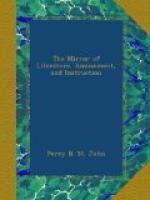“No,” he replied, “not on their account wholly. They are ignorant and insolent enough; but it was to protect myself against the governments of Europe, who are determined to get possession of my secret by force. I have been,” he exclaimed, “twice fired at in one day through that window, and three times attempted to be poisoned. They believed I had written a book containing my secrets, and to get possession of this book has been their object. To baffle them, I burnt all that I had ever written, and I have so guarded the windows with spring-guns, and have such a collection of combustibles in the range of bottles which stand at your elbow, that I could destroy a whole regiment of soldiers if sent against me.” He then related, that as a further protection he lived entirely in that room, and permitted no one to come into the house; while he had locked up every room except that with patent padlocks, and sealed the key-holes.
It would be tedious and impossible to follow Mr. Kellerman through a conversation of two or three hours, in which he enlarged upon the merits of the ancient alchemists, and on the blunders and impertinent assumptions of the modern chemists, with whose writings and names it is fair to acknowledge he seemed well acquainted. He quoted the authorities of Roger and Lord Bacon, Paracelsus, Boyle, Boerhaave, Woolfe, and others, to justify his pursuits. As to the term philosopher’s stone, he alleged that it was a mere figure, to deceive the vulgar. He appeared also to give full credit to the silly story about Dee’s assistant, Kelly, finding some of the powder of projection in the tomb of Roger Bacon at Glastonbury, by means of which, as was said, Kelly for a length of time supported himself in princely splendour.
I inquired whether he had discovered the blacker than black of Apollonius Tyaneus; and this, he assured me, he had effected; it was itself the powder of projection for producing gold.
Amidst all this delusion and illusion on these subjects, Mr. Kellerman behaved in other respects with great propriety and politeness; and having unlocked the door, he took me to the doors of some of the other rooms, to show me how safely they were padlocked; and on taking leave, directed me in my course towards Bedford.
In a few minutes, I overtook a man, and on inquiring what the people thought of Mr. Kellerman, he told me that he had lived with him for seven years; that he was one of eight assistants whom he kept for the purpose of superintending his crucibles, two at a time relieving each other every six hours; that he had exposed some preparations to intense heat for many months at a time, but that all except one crucible had burst, and that he called on him to observe, that it contained the true “blacker than black.” The man protested, however, that no gold had ever been made, and that no mercury had ever been fixed; for he was quite sure, that if he had made any discovery, he could not have concealed it from the assistants; while, on the contrary, they witnessed his severe disappointments, at the termination of his most elaborate experiments.




